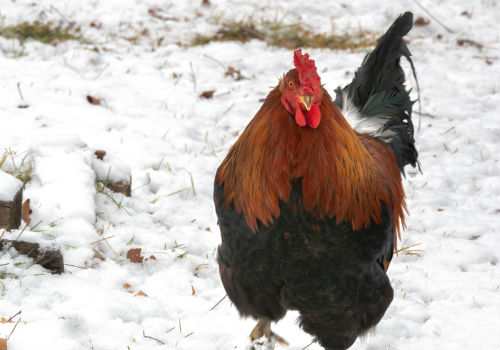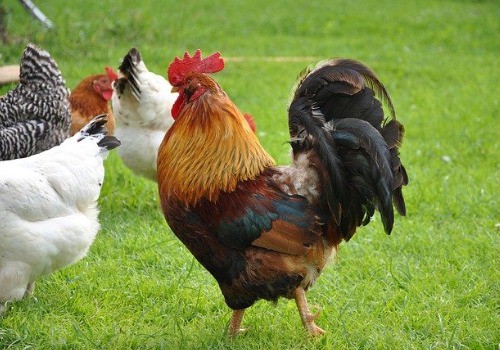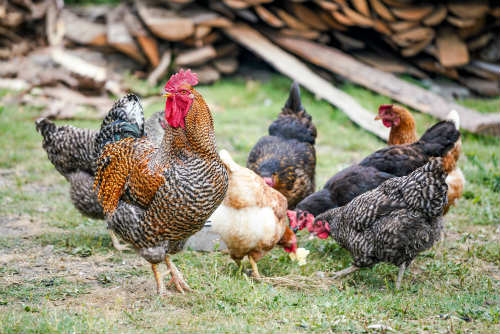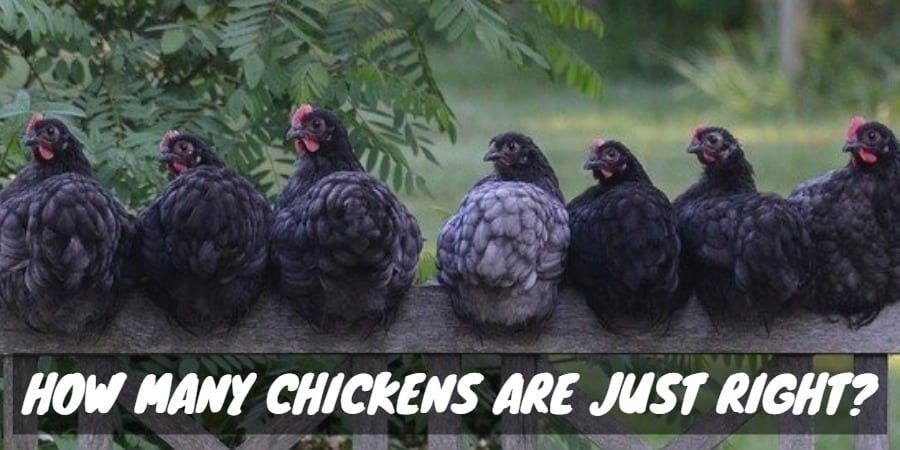Free range chickens can provide an easier form of raising chickens than chickens that are enclosed in a coop at all times. However, unless you live in an extremely temperate climate, the ins and outs of when to let your chickens roam free can be a cause for concern, especially in the cold winter months.
So, when can chickens go outside?
When Can My Chickens Go Outside in the Winter?
Despite their small frames, chickens pack a surprisingly strong metabolism into such tiny bodies, and, as a result, are able to handle temperatures well below what might make a human uncomfortable. In addition, their multiple layers of down and feathers help trap heat close to the skin, so that fully grown chickens can usually be comfortable in temperatures as low as the low teens in Fahrenheit (around -10 degrees Celsius). As long as chickens have been enjoying a healthy diet in the months leading up to winter, and still have access to a place where they can take shelter from harsh wind or rain, your chickens should be comfortable outside for nearly as long as the temperature stays above 10 degrees Fahrenheit.
However, if you’re still worried for your little feathered friends, try adding a heat lamp in their roosting area, and make sure that their roost is somewhere warm, dry, and sheltered from any wind, rain, sleet, or snow. That, combined with a steady diet and, as always, a good, fresh source of water, should keep your chickens happy and healthy throughout the long winter months.

Should I Provide an Alternate Source of Heat for My Chickens?
Heat lamps or heating circuits can be a good way of making sure young chickens aren’t too cold in the winter. Chicks, especially, need to be kept near a heat source at least until they’ve started growing in real feathers, and roosting hens may prefer a source of heat for their eggs as well.
[amazon bestseller=”heater for chicken”]
Once chickens are fully mature, however, they should be able to handle surprisingly low temperatures, as long as it is dry. A dry cold will do nothing besides ruffle your chickens’ feathers, but it is wet, damp, or frigid weather that runs the highest risk of hurting your chickens. On days where snow, sleet, hail, or freezing rain are expected for your general area, it may be best to make sure that your chickens are safe and snug inside. The same layers of down and feathers that will help keep the cold out can also trap freezing water in, and a chicken that has become soaked with cold water runs a very high risk of catching hypothermia before he or she can be fully dried off. If one of your chickens does get soaked, you may want to bring them inside, or help them towel off, so that they’re safe from any chill that they might catch during the wintry weather!
When Can My Chickens Go Outside in the Summer?

Again, chickens’ high metabolisms keep them warm in the winter, but also mean that they can handle higher temperatures during the summer. However, once the temperature starts getting in the mid 90’s (32 degrees Celsius), your chickens are most likely going to be pretty uncomfortable. Most estimate the maximum temperature for chickens during the summer to be somewhere in the low 100’s (40 degrees Celsius) before they start running the risk of heat stroke.
If you notice one of your chickens laying on the ground with its wings fully extended, wandering around with its beak open, or eating less food than usual, these could be signs that your chicken is suffering from heatstroke. If you see this, take the necessary steps to cool that chicken off–try setting up a kiddie pool where your chickens can enjoy some cool water, or provide a mister that will help break some of the heat, or even just let them play or rest near frozen water bottles when the heat gets to be too much.
To keep your chickens cool during the summer, allow them free run of the yard, but also try and provide a source of shade where they can cool off when the day starts to heat up. As always, make sure they have a nice, cold source of water, and add some frozen treats to their daily food, so that they can enjoy the cool for a little bit longer.
Some other tricks for keeping your chickens cool during the heat of the day include spraying cold water in the area around the coop, so that evaporative cooling will help draw some of the heat out of their roosting area, and avoiding foods that are high in corn or starch, as these foods tend to require more energy to digest, and can raise your chickens’ internal temperatures to a dangerous level. Similarly, you may want to avoid interacting with your chickens as much as possible on steamy days, as the added excitement of seeing their favorite humans can lead to increased activity and greater heat as a result. If at all possible, you may want to put a fan inside the chickens’ coop or resting area, so long as it does not disrupt the order of the coop, so that the chickens can enjoy a nice stream of cool air on even the hottest days!
[amazon bestseller=”automatic water for chickens”]
Should I Release the Entire Flock Out at the Same Time?

Chickens are very social creatures, and so they are more likely to enjoy themselves when they are surrounded by other birds of a feather (so to speak). During the winter, when a flock may choose to stick close in order to take advantage of each others’ body heat, letting chickens outside in a flock may go a long way to making sure that they are happy and healthy all winter long.
On the other hand, during the summer, letting all of your chickens out at once may lead to a little too much activity. Some chicken owners recommend separating male and female chickens during hot summer days so that they won’t get overexcited from all the social interaction, but this could lead to fighting among roosters and hens that would similarly waste a lot of their precious energy.
If you are letting chicks outside for the first time, make sure that they are close enough to their mother hen or other brooding hens to feel comfortable and safe as they explore their new environment, a precaution that will also prevent the mother hens from being too stressed about the separation. Ultimately, you know your flock better than anyone else, and the degree to which your chickens get along on warm and cold days should be the deciding factor as to when they are allowed outside together, in small or large groups!




